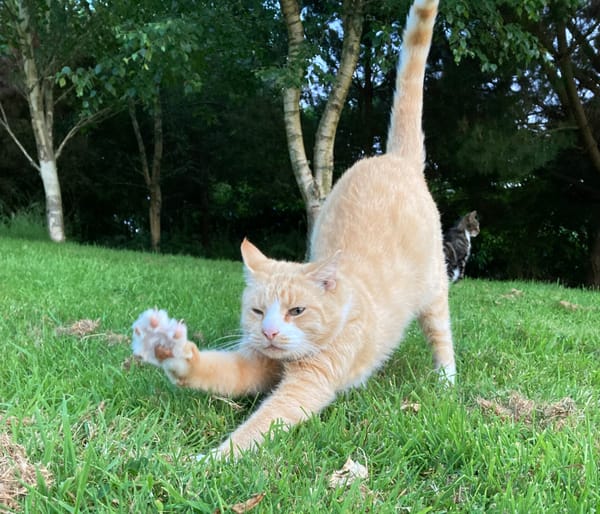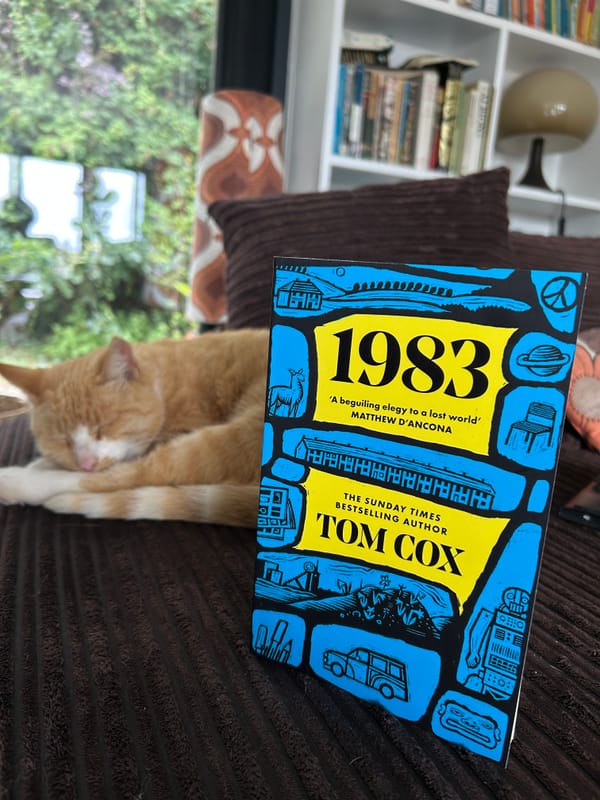Water
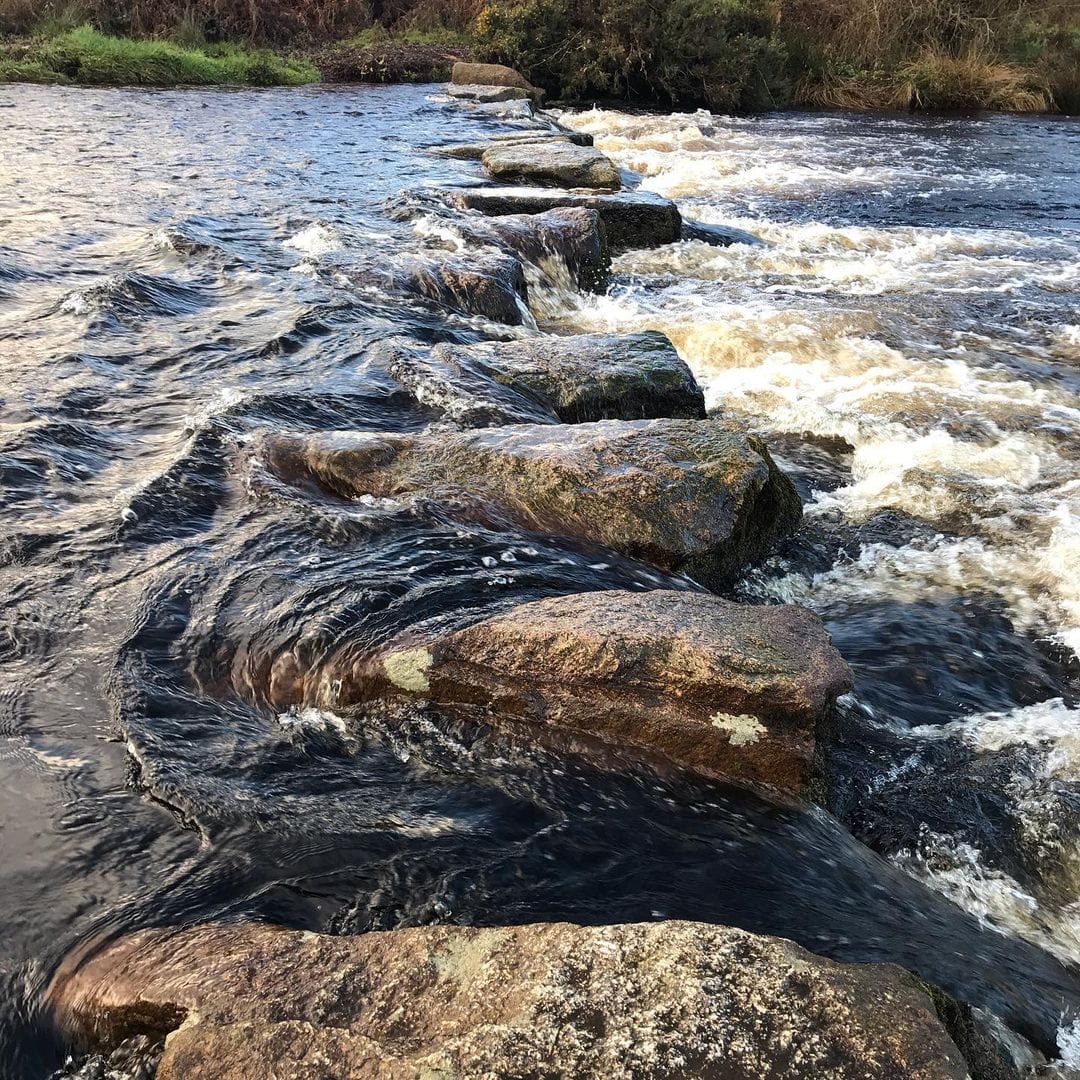
This is a piece I wrote in 2020, which the majority of you probably won’t have previously read. It popped into my mind because I was thinking about the astonishing weight of water and how often we underestimate it, after the frightening recent floods in my mum and dad’s village in Nottinghamshire. I also it’s another example of the “everything good is bad, everything bad is good” pattern I was talking about here last week. Directly after the events described in the essay below, I got very poorly with shingles, then a blood clot, and - amidst all of it - had to hurriedly find a new place to live. Some of this inevitably ended up being transmuted into the narrative of the very watery novel I was writing, Villager. It added some colour - and pain - to the book which I can now see was one of the many tiny factors that still makes me proud of it. For those of you who’ve been considering subscribing to this page, or reading the book, I also wanted to let you know that I’m offering 50% off annual subscriptions to my Substack page, with a free signed paperback of Villager and one of a selection of lovely bookmarks designed by my mum and dad, until the end of Thursday this week. (There’ll also be a brand new, music-themed piece coming here very shortly, with an extra exclusive bit for paid subscribers.)
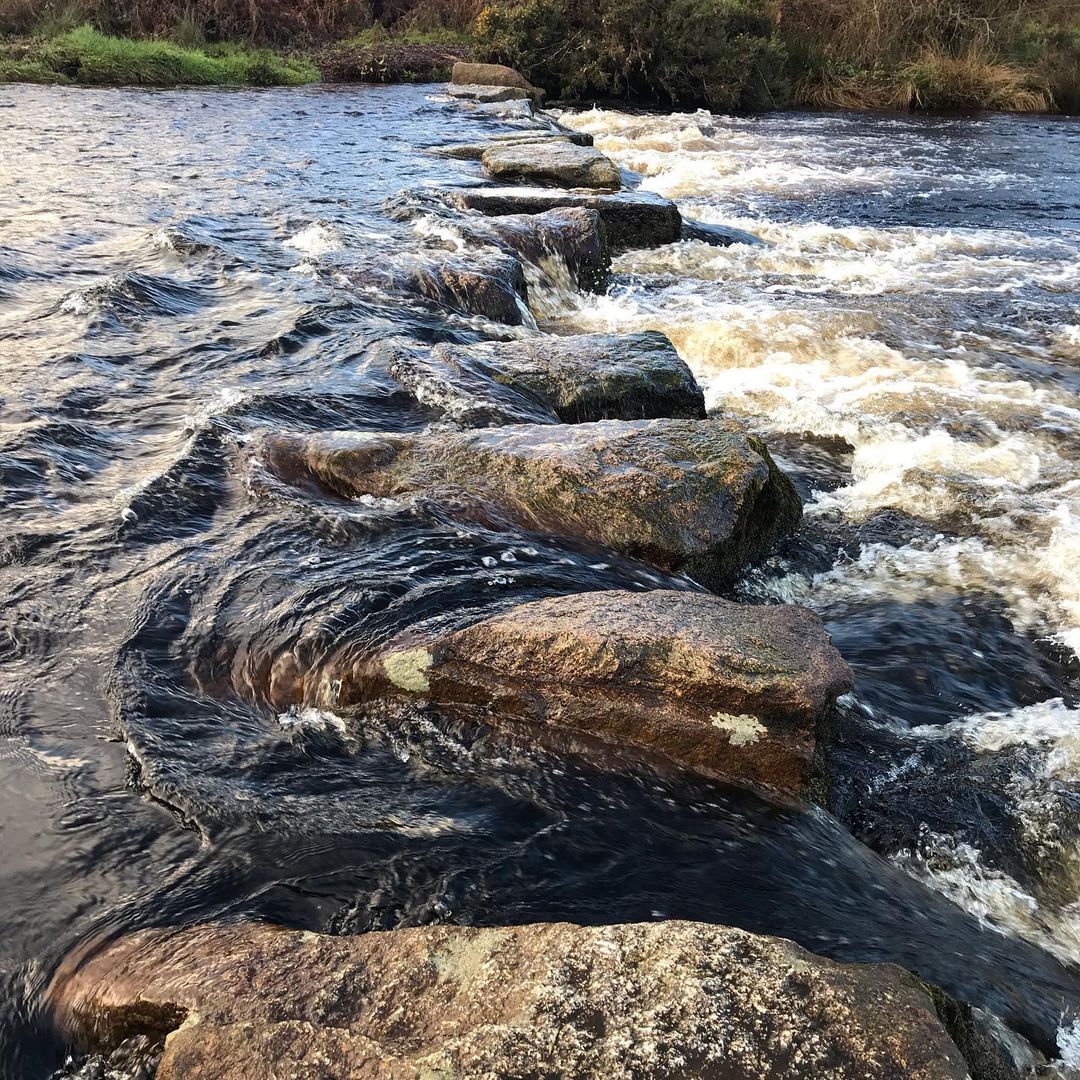
Take out a full annual subscription to The Villager this week, get 50% off AND receive a free signed paperback of Villager AND bookmark.
My house flooded this month. Twice. First, water seeped through the back wall of the living room, turning the floorboards black. Next, it poured through the kitchen ceiling from the bathroom. It was hard to tell at first if the two floods were related, and, though now it seems more likely they were, it has not been confirmed. It might not ever be confirmed, because some of what goes on deep in the bowels of an old house will always be a mystery. To an extent, the house has been damp from my first day in it. Before I moved in, I pointed out a patch of damp on the bedroom wall to the lettings agent, who reassured me that it had built up because the place had been empty all winter and the builder who’d worked on the house was sure it would go away once the central heating had been on for a while. It didn’t. The damp has got worse since then, and has appeared in other places: the living room walls are wet to the touch, especially after heavy rain, and paint is peeling in several rooms. My clothes give off a mildewy odour if I dry them indoors. The salt, pepper, chilli flakes and flour in the cupboard against the back wall of the kitchen have all gone sticky, as if in the gradual process of liquifying. I was in denial about all of this for a while, partly because I don’t want to be a fussy tenant, and partly because I like this house, have worked hard on it, put extra money into making it pleasant to live in and rejuvenating its garden, and had intended to stay here a long time. But then I began to smell a strong drain smell: not sewagey, but earthy, stagnant. A smell that seemed to belch and growl from an era long since put to bed. I noticed that the downstairs toilet began to bubble any time water went down a plughole. Then there were the floods: the sly one that made its way into the living room while I slept, and the dramatic one that happened when the shower was put into use on Thursday last week.
Yesterday I queued outside a chip shop for chips for the first time since last year when the world was still just about the same one I’d grown up inside, and listened to a man across the road telling a couple he knew how brilliantly everything was going in his life: how he had moved to an amazing house, in the best village, and how his business was booming like never before, even in this unusually strained economic period. The couple listened, not adding anything about their own lives, as he reassured them of his success. It was good in a way to discover not everyone was having a difficult time right now, but I also worried for the immediate future of the successful man, who was breaking one of life’s most central and timeless rules, which is that you should never announce emphatically that anything is going well for you, since it will act as a trigger for everything to go the opposite of well. I learned this rule a while ago but nonetheless broke it earlier in the year by announcing to a few people that the water in my life was going well, and now water is punishing me for it.
I love the rainy, sometimes sunny climate of Dartmoor and its border villages: the pockets of weather that can vary so radically from valley to valley, the clouds that sink into vases of deep green land, do their work to help maintain that greenness then move on. I like walking in the rain here and I like seeing what it does to the plants in my garden. I like the way footpaths and streams are often interchangeable. Water was a very decisive factor in my decision to live here: the deafening rush of the leat across the lane, the taste of what came out of the tap, so immeasurably more flavoursome and soft and refreshing than what I had got used to drinking in Norfolk over the previous nine months. “Yep, that’s it,” I thought, the first time I drank it. “That’s what’s been missing.” You walk along the street in a nearby town with your bag of rain and, strangely, you don’t mind it, because you’re very hungry after a long walk along the high shouting river, and there are some chips in there too right at the bottom of the bag, just a few, and they taste good, because everything tastes good after a long walk in the rain. Water is in your entire being here, altering it, influencing the taste of everything. I have rain and sea and river in my hair and damp pebbles in my shoes and cuts across my stomach and chest from when I scraped them against rocks when I leapt off other rocks into water. You feel it all even more at the scab end of August, after a summer that some other British people told you was dry and hot, not realising that the South West Peninsula is not really in Britain, and that weather is different here: cooler and damper in summer, warmer and damper in winter, rainier almost all of the time, especially recently. If you can’t see Dartmoor, it’s raining. If you can see Dartmoor, it means it’s about to rain. You walk on the moor and the wet grass unlaces your shoes. It wants to see you on the ground, flat on your face. You look at the raging green wilderness outside your back door and think nostalgically of the time three or four weeks ago, when it was still a garden. It’s August: the darkest month that doesn’t happen in winter. Everything is scruffy and angry and moist, before autumn comes in to crisp it up and prettify it again.
Sometimes you can gaze up from the foothills to the high part of the moor and be forgiven for believing it is the place where all water is made. This is actually part-true. There are eight reservoirs on Dartmoor, all built between 1867 and 1972 as the rapidly expanding villages and towns below them demanded cleaner water. When the water is low, the remains of sunken farmsteads and clapper bridges and Bronze Age villages can be seen in some of the reservoirs. When they made Fernworthy Reservoir, they drowned an entire farm. Not long after I moved back to Devon, in April, I followed the river nearest my house, the Avon, on foot to the reservoir at its summit. It was a benign, dry spring day and the water didn’t look like it would give you much trouble. But right now, every one of the rivers that rush down from the moor to the torn edge of the country is singing a rowdy, drunken song. Outside the Co-op, in Ivybridge, the Erme is getting high and being a thug, hissing and swearing at the locals. Down under the bridge, near the dual carriageway, in South Brent, the Avon is taking some drugs it found floating in a bag. Right now, as I write this, it feels like the destination of all this intoxicated water is the low point where my house sits. It’s rushing down the lane, right at me. The rain, meanwhile, could not be louder if I was in a tent. As I write, the power in my house is going on and off, every two minutes. Caterpillars are crawling up the back wall, well-fed by my cabbages, and huddling up cosily away from it in their new chrysalises. Three of my last four stalks of corn were broken in Storm Francis. The other is now almost as tall as the house and will probably have reached all seven miles up to the Avon Dam Reservoir by tomorrow.
Since the construction of those reservoirs, some of the larger villages on the fringes of Dartmoor have gained mains sewage facilities. The village where I live has not and, being so tiny and rural, I would not expect it to have. This made me think it was strange that there was no mention at all in my tenancy agreement of a septic tank. When, frustrated by the floods in my house, the smell in my house, and my landlord’s total lack of urgency in responding to it, I called an emergency drains company out last Friday, they asked if a septic tank was present. I told them what the landlord had told me, which was that there was no septic tank, and that “everything worked on a soakaway”, but also told them that I thought this odd, since a soakaway functions in tandem with a septic tank, or an eco-friendly reed bed, which this house definitely does not have. Much as we might like to think so, waste does not just “vanish”. What followed, after the drain men’s discovery of a totally blocked pipe, was a treasure hunt, with the significant catch that unlike most treasure hunts the reward at the end of it would not be treasure, but shit. Finally, the drain experts uncovered a rusty grate deeply submerged amongst many years of foliage. The chamber was full. Had been for who knows how many aeons. That, combined with tree roots growing into the waste pipe leading from the house, had been the cause of the kitchen flood. The drain men gave me the – quite staggering – bill. I called the letting agent. The letting agent called my landlord. My landlord, who lives in Egypt, refused to pay the bill. I paid the bill.
Not many people make it their life’s ambition to work with drains but what you find is that those who do end up in that area often take a lot of pride in their work. They are rarely of an apathetic or indifferent demeanour. The work of the drain men was more like surgery than repair or maintenance, their camera tunnelling deep into the house’s stomach and telling them what was amiss. I wasn’t here afterwards, when the septic tank man came to empty it, but the note he left, detailing the “dangerous condition” of the tank, is a small, dark, poetic masterpiece of some bygone English I never knew existed. After reading it, it is hard not to picture a man of ancient years and hawkish appearance who upon putting an ear close to the ground can actually hear sludge speak to him. One of the last of his breed. Perhaps the last. What had he seen, in his time? I suspected this house, empty and in a state of disrepair for a few years before my occupancy, and backed up with waste of olden times, was child’s play to him. But it’s still been very derailing for me, and now I’m sitting here, not massively far off a thousand pounds out of pocket, with a landlord who appears to be unwilling to reimburse me. And with the concomitant feeling that I’m at fault here. Not for the problem itself – that’s definitely not my fault – but in the same way I have often felt lingeringly at fault as a renter, when the rental process has shat all over me. At fault for not having a proper, sensible job, for not having made money earlier in my life, for living in this era, for not owning a house, for choosing instead to spend my early middle age being dictated to and infantilised by people who make their money by owning houses and getting other, poorer people to pay to live in them.
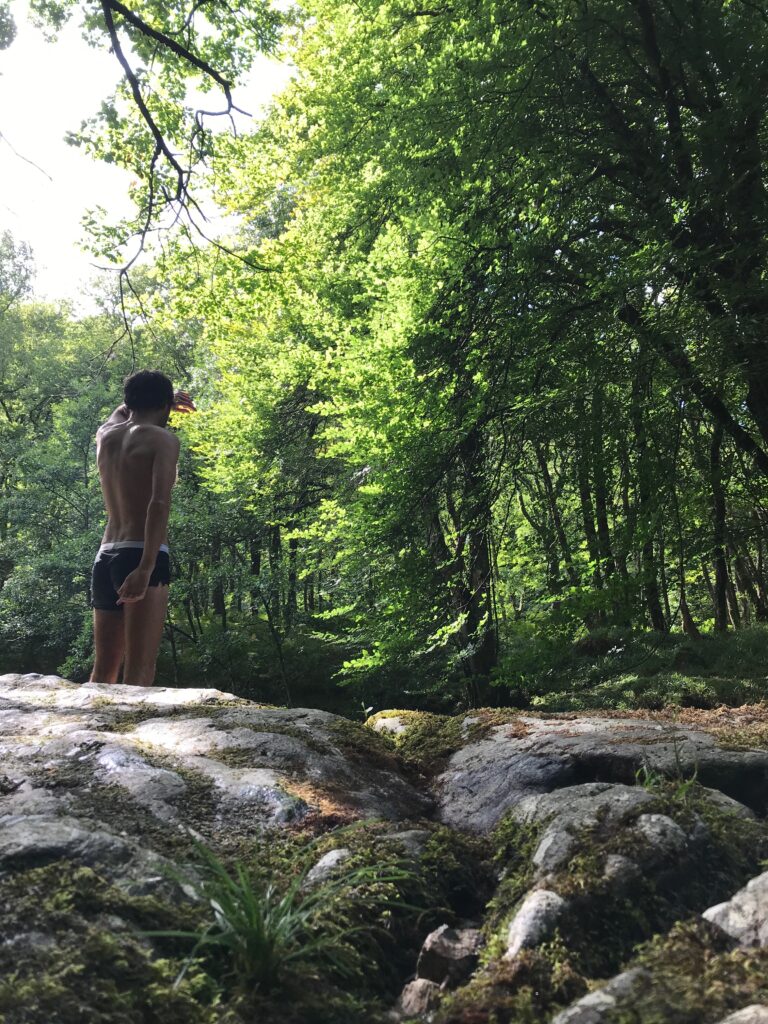
On Wednesday, tired of worrying about that expensive drain clearance and inspection fee, wondering what in my house I could sell to help cover it – LPs (mercifully these hadn’t been damaged by the flood), a sofa, my geriatric cat Ralph – I walked deep and high into the moor, along another of its rivers, The Dart: the biggest and drunkest and noisiest of them all. I cut away, up through woodland, took a new quiet path down the valley and disturbed two buzzards who were disembowelling a rabbit. They flew off, shrieking imperiously down at me, landlords of the sky. The river screamed its stories at a higher and higher pitch as I reached a more remote part of it, climbed a steep path, and descended another to a rocky platform above what is normally a more sedate spot where the water calms for a moment, before forging south. I stripped down to my swimming trunks and lingered on the edge a while. The river looked blacker and more churning than I’d ever seen it here. There were big pointy rocks down there, which I had always been able to see before, but couldn’t now. I tried to remember where the spot was where the rocks under the water weren’t so high. My back and stomach hurt, as they had for the last couple of days. I hesitated. No phone reception up here. Not a hint of it. The water looked very, very black but I also could not think of one time when jumping into it had not made me feel renewed and revitalised. I wanted that. That was why I had walked over seven miles here and would soon walk over seven miles back. I let myself jump, feeling just for a split second before I hit the surface that it might all, the whole lot, come down to this small mistake. I hit the surface and let the momentum take me as far under as it needed to. I was under for barely any time at all but while I was I felt I was somewhere else: somewhere where nothing was anything any more. Somewhere darker than any night, any dream. I emerged into the sunlight and the sunlight felt like something you could suddenly eat. I swam against the current, my front crawl just strong enough to defeat it and get back to the rocks on the bank. Unusually for me, I opted not to jump again. On my way back up the valley, the buzzards were back at the rabbit, coming back for more even though it was almost all gone in the first place.

